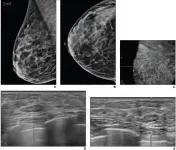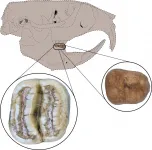INFORMATION:
The research reported in this story featured scientists from Skoltech's Space Center, Center for Computational and Data-Intensive Science and Engineering (CDISE), and Digital Agriculture Lab (DAL).
Skoltech is a private international university located in Russia. Established in 2011 in collaboration with the Massachusetts Institute of Technology (MIT), Skoltech is cultivating a new generation of leaders in the fields of science, technology, and business, conducting research in breakthrough fields, and promoting technological innovation with the goal of solving critical problems that face Russia and the world. Skoltech is focusing on six priority areas: data science and artificial intelligence, life sciences, advanced materials and modern design methods, energy efficiency, photonics and quantum technologies, and advanced research. Website: https://www.skoltech.ru/.
Learning aids: Skoltech method helps train computer vision algorithms on limited data
2021-07-15
(Press-News.org) Researchers from Skoltech have found a way to help computer vision algorithms process satellite images of the Earth more accurately even with very limited data for training. This will make various remote sensing tasks easier for machines and ultimately the people who use their data. The paper outlining the new results was published in the journal Remote Sensing.
Researchers have been using computer vision and machine learning techniques to help with environmental monitoring for a while now. Tasks that may seem tedious and prone to human error are normally a piece of cake for algorithms. But before a neural network can successfully, say, discriminate between the kinds of trees in a forested area, it needs to be trained, and therein lies a challenge.
Satellite images are not your average cell phone photos, which you can take by the dozen in a moment: There are only so many shots available per orbit, the resolution is limited, and clouds can always get in the way. So, getting enough well-labeled images to train a neural network can be a nuisance, and scientists and engineers have created workarounds in the form of image augmentation.
"While they are very powerful, neural networks demand a lot of training data to achieve top results. Unfortunately, in practical tasks, we usually don't have enough data. To overcome this issue, data scientists apply various techniques that artificially increase datasets. One of the most popular methods is called image augmentation. It transforms images to add variability," Sergei Nesteruk, Skoltech PhD student and co-author of the paper, explains.
Skoltech Professor Ivan Oseledets and his colleagues developed an augmentation method called MixChannel for multispectral satellite images. This method is based on substituting bands from original images with the same bands from images of another date covering the same area.
"It is easy to use image augmentation for generic RGB images. But multispectral data is very complicated, and there was no efficient way to augment it. MixChannel is the novel augmentation technique designed to work specifically with multispectral data," Svetlana Illarionova, another co-author of the paper and Skoltech PhD student, says.
To test their approach, the team used Sentinel-2 satellite images of conifer and deciduous boreal forests in the Arkhangelsk region of northern European Russia to train a convolutional neural network to classify these forests. "A straightforward approach for training a CNN classification model is to take a set of available satellite images for a given territory during a period of active vegetation. The training set is constructed by taking a random patch of a large image. ... However, if we test the obtained model on an image taken on a date that was not included in the training set, the accuracy can drop dramatically," the authors write.
Since it is normally quite cloudy in the Arkhangelsk region, the number of satisfactory satellite images was severely limited - to just six, in fact. But despite the small sample size, the new approach outperformed state-of-the-art solutions when tested with three neural networks, and, as the authors note, it can be combined with other augmentation methods for even more training data.
Other remote sensing-related tasks this approach can help with include various environmental studies and precision agriculture - basically whenever you have medium spatial resolution data and not a lot of images available. In further work, scientists will expand the method to deal with more land cover types and larger areas with different environmental conditions.
ELSE PRESS RELEASES FROM THIS DATE:
High daily screen time linked to cognitive, behavioral problems in children born extremely preterm
2021-07-15
WHAT:
Among 6- and 7-year-olds who were born extremely preterm--before the 28th week of pregnancy--those who had more than two hours of screen time a day were more likely to have deficits in overall IQ, executive functioning (problem solving skills), impulse control and attention, according to a study funded by the National Institutes of Health. Similarly, those who had a television or computer in their bedrooms were more likely to have problems with impulse control and paying attention. The findings suggest that high amounts of screen time may ...
Routine screening for BI-RADS lesions on automated whole-breast ultrasound
2021-07-15
Leesburg, VA, July 15, 2021--According to ARRS' American Journal of Roentgenology (AJR), return to routine screening for BI-RADS 3 lesions on supplemental automated whole-breast US (ABUS) substantially reduces the recall rate, while being unlikely to result in adverse outcome.
"This prospective study supports a recommendation for routine annual follow-up for BI-RADS 3 lesions at supplemental ABUS," wrote lead author Richard G. Barr of Northeastern Ohio Medical University in Rootstown.
From August 2013 to December 2016, Barr and colleagues' prospective study (NCT02650778) ...
"Get out of the water!" Monster shark movies massacre shark conservation
2021-07-15
Undeniably the shark movie to end all shark movies, the 1975 blockbuster, Jaws, not only smashed box office expectations, but forever changed the way we felt about going into the water - and how we think about sharks.
Now, more than 40 years (and 100+ shark movies) on, people's fear of sharks persists, with researchers at the University of South Australia concerned about the negative impact that shark movies are having on conservation efforts of this often-endangered animal.
In a world-first study, conservation psychology researchers, UniSA's Dr Briana Le Busque and Associate Professor Carla Litchfield ...
Modified yeast inhibits fungal growth in plants
2021-07-15
About 70-80% of crop losses due to microbial diseases are caused by fungi. Fungicides are key weapons in agriculture's arsenal, but they pose environmental risks. Over time, fungi also develop a resistance to fungicides, leading growers on an endless quest for new and improved ways to combat fungal diseases.
The latest development takes advantage of a natural plant defense against fungus. In a paper published in Biotechnology and Bioengineering, engineers and plant pathologists at UC Riverside describe a way to engineer a protein that blocks fungi from breaking down cell walls, as well as a way to produce this protein in quantity for external application as a natural fungicide. The work could lead to a new way of controlling plant disease that reduces reliance on conventional ...
Emotion, cooperation and locomotion crucial from an early age
2021-07-15
What are the fundamental skills that young children need to develop at the start of school for future academic success? While a large body of research shows strong links between cognitive skills (attention, memory, etc.) and academic skills on the one hand, and emotional skills on the other, in students from primary school to university, few studies have explored these links in children aged 3 to 6 in a school context. Researchers from the University of Geneva (UNIGE) and Valais University of Teacher Education, Switzerland (HEP-VS), in collaboration with teachers from Savoie in France and their pedagogical advisor, examined the links between emotion knowledge, cooperation, locomotor activity and numerical skills in 706 pupils aged 3 to 6. The results, to be read in the journal ...
Human waste contaminating urban water leads to 'superbug' spread -- study
2021-07-15
Contamination of urban lakes, rivers and surface water by human waste is creating pools of 'superbugs' in Low- and Middle-Income Countries (LMIC) - but improving access to clean water, sanitation and sewerage infrastructure could help to protect people's health, a new study reveals.
Researchers studied bodies of water in urban and rural sites in three areas of Bangladesh - Mymensingh, Shariatpur and Dhaka. They found more antibiotic resistant faecal coliforms in urban surface water compared to rural settings, consistent with reports of such bacteria in rivers across Asia.
Publishing their findings in mSystems today, researchers from the University of Birmingham and the International Centre for Diarrhoeal Disease Research, Bangladesh call for further research to quantify the drivers ...
Hopkins Med news update
2021-07-15
COVID-19 NEWS: CAN DIETARY SUPPLEMENTS HELP THE IMMUNE SYSTEM FIGHT CORONAVIRUS INFECTION?
Media Contact: Patrick Smith, pjsmith88@jhmi.edu
Johns Hopkins Medicine gastroenterologist Gerard Mullin, M.D., and a team of co-authors published an article May 11, 2021, in Advances in Experimental Medicine and Biology that details the scientific rationale and possible benefits -- as well as possible drawbacks -- of several dietary supplements currently in clinical trials related to COVID-19 treatment.
According to business analysts, the U.S. nutritional supplement industry grew as much as 14.5% in 2020, due in large part to the COVID-19 pandemic.
Mullin, associate professor of medicine at the Johns Hopkins University ...
Fossil rodent teeth add North American twist to Caribbean mammals' origin story
2021-07-15
GAINESVILLE, Fla. --- Two fossil teeth from a distant relative of North American gophers have scientists rethinking how some mammals reached the Caribbean Islands.
The teeth, excavated in northwest Puerto Rico, belong to a previously unknown rodent genus and species, now named Caribeomys merzeraudi. About the size of a mouse, C. merzeraudi is the Caribbean's smallest known rodent and one of the region's oldest, dating back about 29 million years.
It also represents the first discovery of a Caribbean rodent from a North American lineage, a finding that complicates an idea ...
Early intervention in schools needed to address Malta's obesity crisis
2021-07-15
A new study by the University of Malta and Staffordshire University highlights an urgent need for change in the curriculum and demonstrates how introducing longer, more frequent and more physically intense PE lessons can significantly improve children's weight and overall health.
Malta currently has one of the highest rates of obesity worldwide with 40% of primary and 42.6% of secondary school children being overweight or obese.
The World Health Organization (WHO) recommends that children engage in at least 60 minutes of age-appropriate moderate-to-vigorous physical activity (MVPA) daily, however ...
On the front lines: Correctional nurses and the COVID-19 pandemic
2021-07-15
New Rochelle, NY, July 14, 2021-Firsthand reports from nurses in correctional facilities detail the challenges they faced during the COVID-19 pandemic. These firsthand accounts are reported in a special issue on correctional nursing in the Journal of Correctional Health Care. Click here (https://www.liebertpub.com/toc/jchc/27/2) to read the issue now.
Karen Monsen, PhD, RN, School of Nursing, University of Minnesota, and colleagues present the Omaha System COVID-19 Response Guidelines, which provide evidence-based pandemic response interventions used in correctional ...




